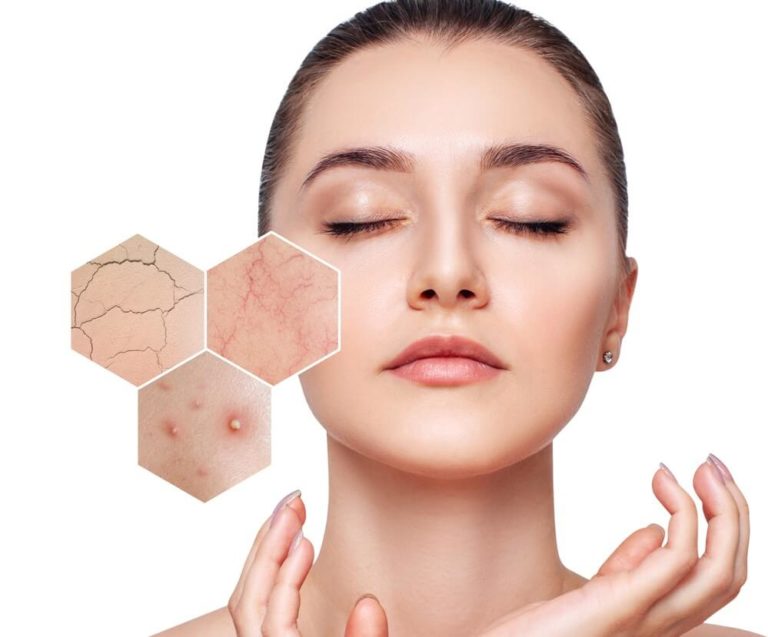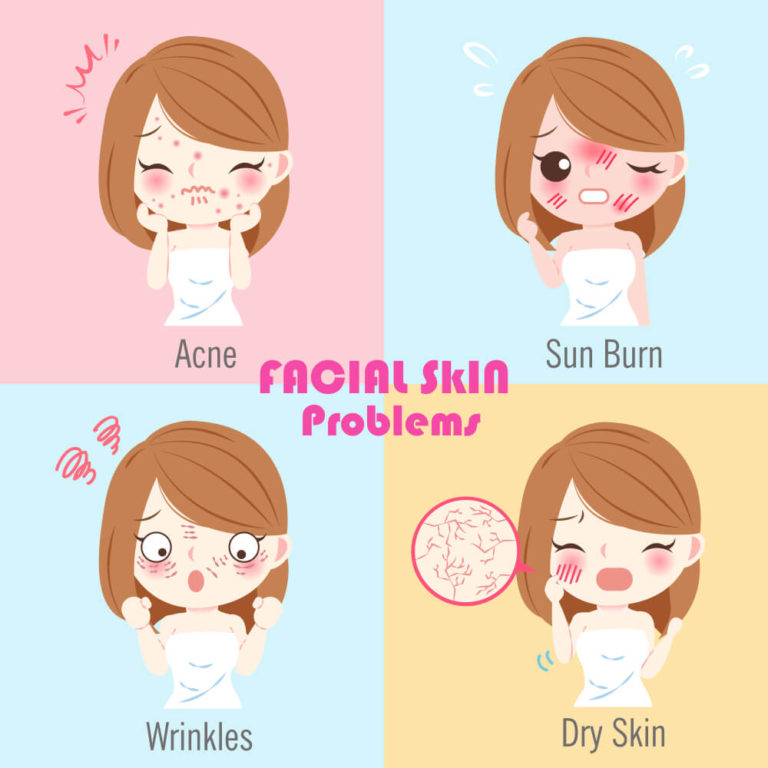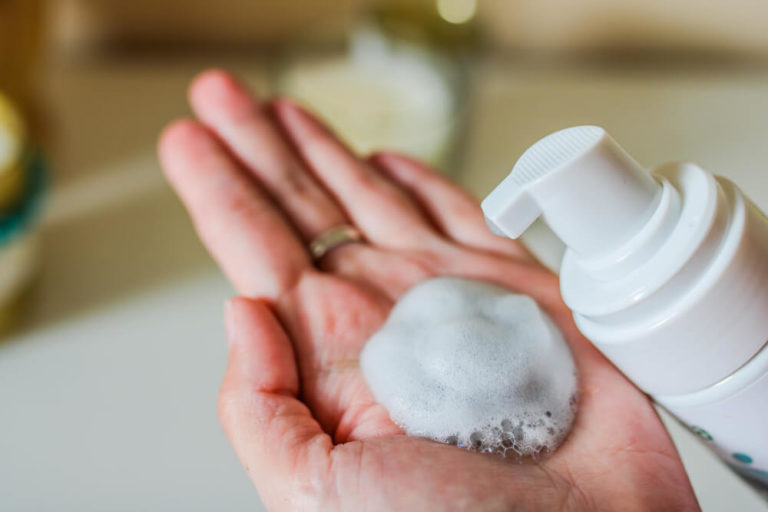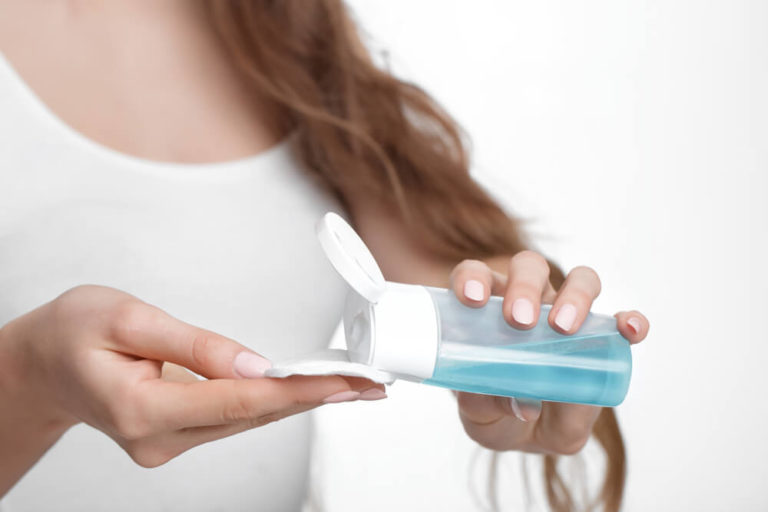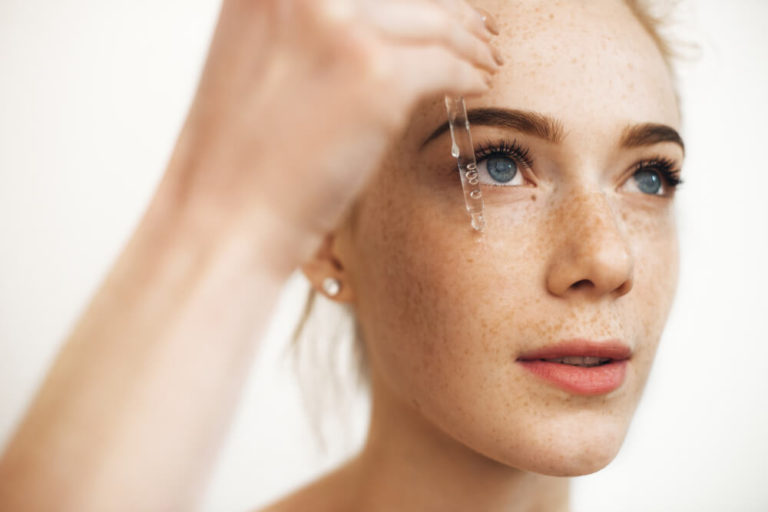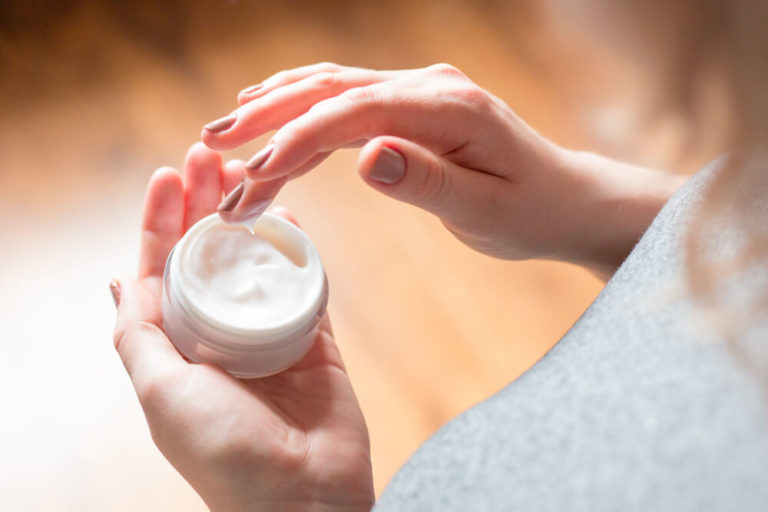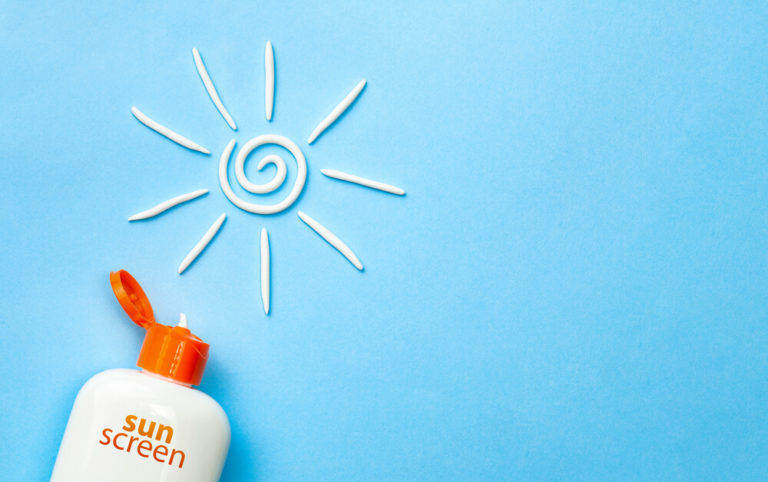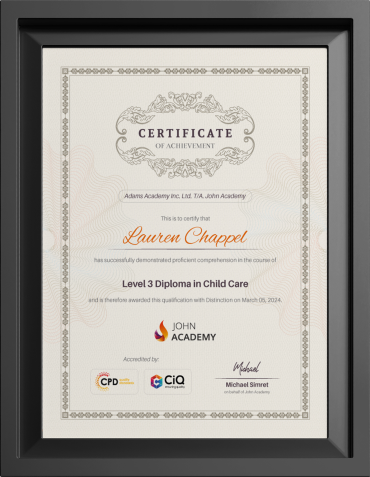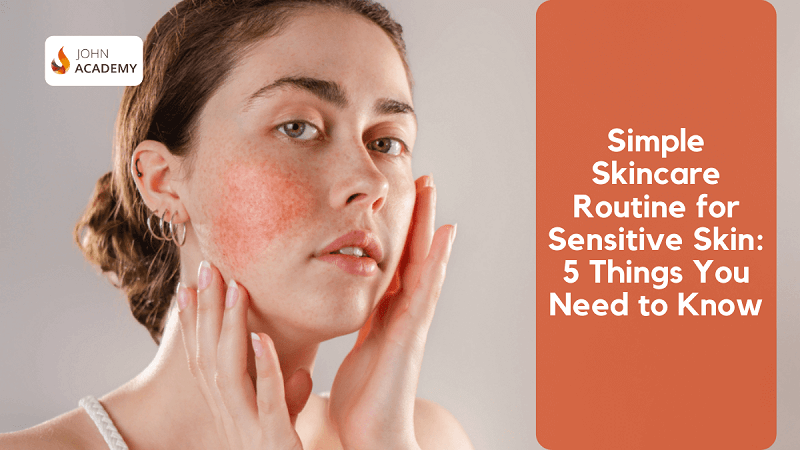
Our skin is our most favourite body part. We love to take care of it by all means. We also love to experiment with it, like trying out different skincare products, makeup and treatments. But when it comes to sensitive skin, everything can become a restriction. By being sensitive, your skin reacts to almost everything, like weather changes, food habits, hormonal changes, and chemicals in makeup products. A simple skincare routine for sensitive skin will save you from all the irritation.
It can be tough to choose the right skin care product that suits your skin perfectly. Furthermore, sensitive skins need a more careful set of skincare routines than other types of skins. They struggle with finding a simple skincare routine for sensitive skin that will save them from irritation. Today we are here to share with you five secrets of a simple skincare routine for sensitive skin and dig deeper into this topic.
Table of Contents
What is Sensitive Skin?
Before we jump into the five best tips for a simple skincare routine for sensitive skin, let’s see what sensitive skin can be like. Sensitive skin is not any disease that a dermatologist diagnoses you with. Instead, sensitive skin describes the skin that is more prone to inflammation, irritation, discomfort. These usually occur due to different conditions and products. The causes and also symptoms of sensitive skin also changes from person to person.
On the one hand, for some people, sensitive skin comes genetically. On the other, sensitive skin can develop gradually in someone due to different kinds of factors. It can happen because of many things like climate change, fragrance and chemicals in skin products that you are using and even occur due to poor health and diet or because of any kind of medication you are taking.
People with sensitive skin have a heavy reaction to dust and get sunburnt more severely than usual. Moreover, they get rashes or irritation from clothing or friction. Many times people with sensitive skins are allergic to food or some kind of substances that come in contact with them.
Furthermore, sensitive skin is also a symptom of underlying health issues. So you must always be aware of the things that are triggering your skin reaction. Looking for potential triggers and also how to soothe them will help you to take care of sensitive skin. Therefore, you will be able to look after your skin and also improve the quality of your life.
John Academy is providing an excellent Complete Skin Care Course. This course is designed to help you look after your skin and make it flawless with or without cosmetics.
What are the Signs of Having Sensitive Skin?
As different people show different kinds of signs and symptoms upon having sensitive skin. In order to get into a simple skincare routine for sensitive skin, you have to understand what are the signs of sensitive skin you are facing. We have compiled some signs that sensitive skin people usually suffer from time to time. Most importantly, if you face the following symptoms regularly, it is always wise to get in touch with a dermatologist.
1. Reactive skin
With sensitive skin, you will likely notice that that skin reacts when it comes in contact with certain soap, perfumes, fragrances, skincare products, detergents or any kind of household products. Your skin will become itchy, red or rash. Furthermore, all these are also triggered by exposure of skin to direct sun, cold, or wind.
2. Rashes
When you have sensitive skin, your irritants can trigger rashes. Your skin may become red, dry, flaky and also have several minute red bumps. It mainly occurs from skincare products, makeup, facial cream, or foundations that don’t suit your skin type. Rashes can be very uncomfortable, stubborn and itchy. If you are allergic to something and know exactly what triggers the irritation, you must stay away from it.
3. Too Dry Skin
Sensitive skins are often dry skins. It leads to frequent breakouts, acne and also cracked skin. In addition, dry skin can be more irritating in cold, dry weather and when faced with the harsh wind. For dry skin, you must find a mild and gentle moisturiser. Also, try to protect the skin from harsh elements to fight problems of dry skin.
4. Redness of skin
Sensitive skins sometimes become reddish when it comes in touch with a trigger. It can seem like your whole face or certain parts of your skin is blushing, flushing, forming rashes or getting red bumps. It can even be a red dilated blood vessel as well. In order to get rid of this redness, you either have to keep away from the irritant or seek some minor treatment.
5. Skin is Acne-Prone
Having sensitive skin means you are prone to develop frequent acne. They usually look like red bumps and even appear white like pustules. These breakouts are also likely to get fungal infections and can take a serious turn if not taken care of properly. You will find many products to help you with an acne breakout, but sometimes they may also worsen the condition. In this kind of acne situation, you must contact your doctor and determine what products are right for you. Discuss with your dermatologist remedies that will clear out your acne without causing further irritation.
6. Easily get Sunburnt
To top all the bad sides of sensitive skin, it also includes getting sunburnt easily. If your skin is flaking or peeling, it is even more likely to get harmfully affected by the sun. It is mandatory to wear sunscreen when you are going out, specifically on your face. But you have to choose your sunscreen wisely since many sunscreens can cause allergic reactions in sensitive skin and even on normal skin.
5 Things You Need to Know About Simple Skincare Routine for Sensitive Skin
Now we have promised a simple skincare routine for sensitive skin. Therefore, we will discuss five steps that will help you to take care of your beautiful, sensitive skin and keep irritation away. By following these regularly, you can be in comfort with your skin. If you are not sure when your skin is going to flare up or what is going to trigger your sensitive skin. This simple skincare routine for sensitive skin will help you stay in relief. So let’s go through the five things that you need to know for a sensitive skin care routine.
1. Always Use Gentle Cleanser
All kind of skincare routine starts with cleaning your face with a cleanser. It is no different for sensitive skin. Therefore, the first step of the simple skincare routine for sensitive skin is to cleanse your face with a gentle cleanser. Use it twice a day, morning and night. Washing your face with the wrong cleanser or just over-washing your face can trigger your skin badly and also break down your skin barrier.
If you just use any kind of cleanser, it may just add up to the things that are harming your skin. Your cleanser is supposed to help you clear out the dirt, dead cells, pollution, excessive body oil, makeup, sunscreen and other impurities that built up on your face over hours. However, washing your face just with water may not help the case. It is not enough to cleanse your skin for the already mentioned impurities. As a result, they will just clog your pores, causing your skin to have breakouts, rash and irritation.
For sensitive skin, it is wise to choose a fragrance-free, mild and soothing face cleanser that will not dry out the essential oil from your face. If you are wearing any makeup, you must clean it off with micellar cleansing water, essential oil or aloe vera gel.
Rinse your face with water, take a small amount of your gentle cleanser and rub it between your clean palms. Then massage it all over your face gently. Wash your hand and rinse your face with the water gently. Repeat it till all the cleanser is washed off. Slowly and gently pat dry your face with a clean towel.
2. Go for Alcohol-Free Toner
Many people with sensitive skin want to avoid toner altogether. This is because many toners contain alcohol and harsh ingredients that can harm your skin instead. But if you tried any toner before that worked for you, do not fear to use it.
Therefore, the second step of your simple skincare routine for sensitive skin is to find yourself a mild toner. Moreover, the toner must be low on alcohol or doesn’t have it all, and also must not have any kind of harsh ingredients. Rather, it has to be mild and have a calming ingredient that soothes your skin.
The reason behind suggesting toner is it has a wide range of advantages. Firstly, it helps to balance the pH level of the skin after you have cleansed it. Secondly, it helps to remove any remaining impurities and dirt from your skin. Thirdly, it helps to soothe your skin from possible irritation.
In case your toner is exfoliating, i.e., it removes dead skin cells with the help of ingredients like glycolic acid. Then use it only at night. You can use hydrating formulas twice a day. Avoid using exfoliating toners and retinoids, and any other kind of exfoliators at the same time.
3. Use Serum or Hydrating Oil
The third step of the simple skincare routine for sensitive skin is to use a serum or hydrating oil on your skin. Serum greatly helps you target and fix issues like wrinkles, fine lines, dark spots, dry skins and much more. Serums also help to lock moisture in your skin and reduce redness or rashes of the face and make you feel glowy and supple.
Serum with antioxidants such as brightening vitamin C serum is best if it is used in the morning. It is because they protect your skin from free radicals, which your skin faces throughout the day. For the night, it is good to use a moisturising serum with hyaluronic acid. It will help your skin from drying at night. It is more important for people to use moisturising serum who are doing anti-ageing or acne treatment. As the treatment may cause irritation and dry out your skin, the serum helps to keep your skin hydrated.
Many serums also contain exfoliants like alpha-hydroxy acids (AHA) or alpha-hydroxy acids (AHA) as well. But whichever serum you choose to use, remember two things. Firstly, you must use a water-based serum before using moisturiser. Secondly, if the serum is oil-based, use it after applying moisturiser.
4. Moisturise Your Skin
The fourth step of a simple skincare routine for sensitive skin is to use a moisturiser. A moisturiser helps to hydrate your skin for a long time and locks in all the layers of products that you have applied to your skin. It also strengthens your skin barriers so that it doesn’t crack up.
For daytime, choose a light moisturiser like lotion that soaks into your skin fast and doesn’t pile under your makeup. If your skin is too dry, use a moisturiser with thicker formula or cream. Try to use a moisturiser with SPF 30 or higher. When picking your moisturiser from a shop, look for ingredients like ceramides or hyaluronic acid. These are the ingredients that help to retain moisture in your skin. In the evening, you can go for a thicker moisturiser or night cream.
Related: Three Reasons For Studying an Online Beauty Courses
5. Don’t Forget Sunscreen
Last but not least, don’t forget about sunscreen. It is the most important step of a simple skincare routine for sensitive skin. Try to use sunscreen, which has ingredients like zinc oxide or titanium dioxide. Also, make sure that you are using a broad-spectrum sunscreen with SPF 30 or Higher. It will protect your skin from UVA and UVB radiation.
Any dermatologist would agree that sun protection is the most important part of a skincare routine. It protects your skin from UV rays and also keeps your skin safe from skin cancer and signs of ageing. If you are using a moisturiser without SPF, you still need to wear sunscreen. Moreover, you must wait 20 minutes before you leave the house if you are using chemical sunscreen so that it is effective.
Glow Up!
Now you know what you can do to take care of your sensitive skin. This simple skincare routine for sensitive skin will help you glow up and pamper your skin in a way that it deserves. If you want to know more about the science behind skincare, you can join our Complete Skin Care Course.
Read more blogs
- AI in Mobile App Development
- How Philanthropy Skills Can Enhance Career Development Across Sectors
- How to Choose the Right Delivery Management Software for Your Business
- From Educator to eLearning Designer: A Beginner’s Guide to Instructional Design Software
- The Importance of Analysing What Your Business Competitors Are Doing
- How to Transform Your CV: Tips for Gaining Skills and Experience
- A Comprehensive Guide to Problem Statements in Social Media Marketing
- How to Build a Marketplace: 11 Proven Steps From Start to Scale
- Destiny 2: A Video Game That Helps Players to Develop Real-World Skills
- What is the ABC Chart for Challenging Behaviour?
